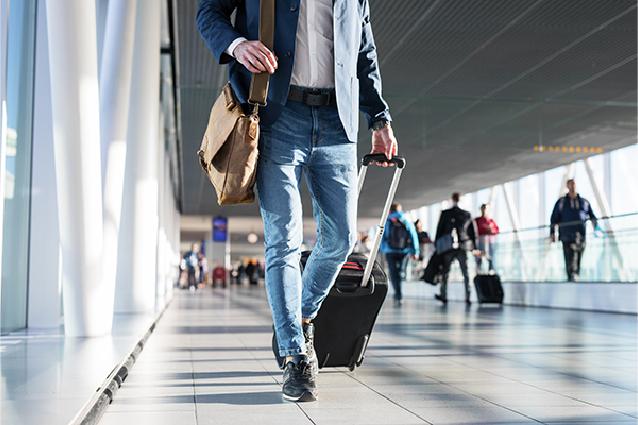
The World Travel & Tourism Council (WTTC) recently launched the second set of safety measures for the aviation industry, airports, tour operators, and the MICE industry. The measures have been undertaken to rebuild confidence for travellers as a part of the organisation’s latest protocols to reopen the travel and tourism sector. The measures are designed to ensure the return of safe travel and enable industries to flourish once again.
According to the latest measures, all airports across the globe have to introduce enhanced cleaning options in areas that would include self-service equipment, baggage trolleys, counters, buggies, security checkpoints, washrooms, elevators, handrails, boarding areas, and common areas with a specific focus on high-frequency touchpoints. Airports have also been asked to provide personal protection equipment (PPE) to staff, such as masks and gloves. Airports will have limit interaction and queuing at touchpoints related to new signage and announcements. Passenger touchpoints might also have to be reduced through online check-in before departure. Airports have been advised to encourage use of self-check in kiosks and bag drop, home-printed bag tags as well as greater use of biometric e-gates and boarding card reading at gates. In cases of mandatory entry-exit screening airports should perform the test in a non-intrusive, walk through manner with the help of full body infrared scanners using handheld infrared thermometers, and ear gun thermometers. Possible pre-arrival health risk assessment should also be considered to prevent delays upon arrival. Airports will also have to undertake better food safety and hygiene at restaurants, with pre-packaged foods to avoid handling of food at buffets. Usage of electronic options and contactless processes for declarations upon arrival has also been advised to minimise contact.
Meanwhile, the aviation industry has also been asked to undertake measures like reducing passenger touchpoints through online check-in before departure, usage of self-check in kiosks and bag drop, home-printed bag tags, greater use of biometric e-gates and boarding card reading at gates. Airlines should also provide PPE to crew and other staffs. WTTC has also asked airlines to provide approved hand sanitizers as appropriate on high-traffic areas, such as check-in and boarding. Airlines have been advised to consider boarding from back of the plane to the front, window to aisle and limit movement in the cabin as much as possible. All crew and frontline staff should be provided with proper training about infection control and hygiene measures. It has also been mentioned that the aviation industry should revisit guidelines for cleaning teams for all areas of the plane including washrooms, as well as check in and boarding areas, with a specific focus on high-frequency touchpoints.
On the other hand, it is also essential for tour operators to enhance sanitation, disinfection, and deep cleaning practices for coaches and other vehicles. Similarly, it is also essential for them to focus on cleaning processes in high-frequency touch points, including handrails, door handles, tables, onboard toilets, air conditioning filters, overhead lockers and headsets. It would also be their responsibility to look after health, hygiene, sanitation, disinfection, and food safety protocols at partner restaurants as well as establish safety protocols with other partners and suppliers including shops, showrooms, tasting venues/shops, museums, shows theatres, concert halls, factories and farms. Tour operators will also have arrange pre-allocated seating plans with no rotation and limit physical contact and queuing wherever possible. They also have to explore staggered timing for access to venues, hotels and restaurants among others.
Lastly, the MICE industry including convention centres and meetings and event organisers will have to implement physical distancing for seating distribution and aisles, utilizing government guidance if available. They have been asked to create visual support to show intent as appropriate. It has been advised that different areas of risk in the venue is distinguished and venue capacity limits for participants are reduced as appropriate and required by local legislation. Authorities will also have to arrange pre-arrival risk assessment questionnaire for participants and create isolation units outside the venue where possible for individuals showing COVID-19 symptoms. MICE venues and destinations will also have to limit physical interaction and possible queuing at reception and registration using advance registration to enhance participant flow. Establishment of additional and separate measures for the cruise sector and insurance businesses, amongst others are also being considered and are currently under development.
Gloria Guevara, President and CEO, WTTC said in a statement that the global private sector has rallied around safe travels protocols for the first time in history and it would help to create the consistency that is essential for the travel and tourism sector to reopen their businesses. She mentioned that the measures provided to the aviation industry are of utmost importance as aviation’s return to power is highly essential to help the global economic recovery.
She shared that the WTTC aviation protocols were created in close collaboration with ACI and IATA. She also appreciated the organisations and its leaders Angela Gittens and Alexandre de Juniac for their guidance as it is important to restore consumer confidence to encourage people to fly safe once again. She further added that the expertise from large and small tour operators, also contributed to define the new experience via tour operators and visiting event venues once again. She said that the measures that have been embraced by businesses around the world were defined in coordination with experts from the sector.
WTTC organised detailed discussions with key stakeholders and organisations to ensure maximum buy-in, alignment and practical implementation, to set clear expectations about the experiences travellers might get in the ‘new normal’. The organisation divided the new guidance into four pillars including operational and staff preparedness, ensuring a safe experience, rebuilding trust and confidence, innovation as well as implementing enabling policies.
Tags: airport operations, aviation sector, Coronavirus, Covid-19, MICE Tourism, Safe travel, The World Travel & Tourism Council (WTTC), tour operators